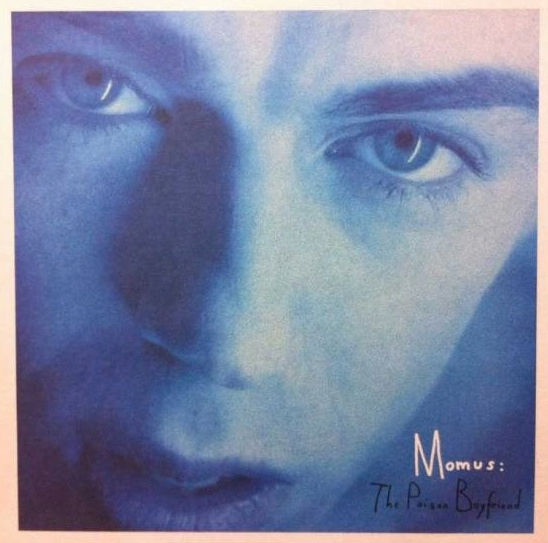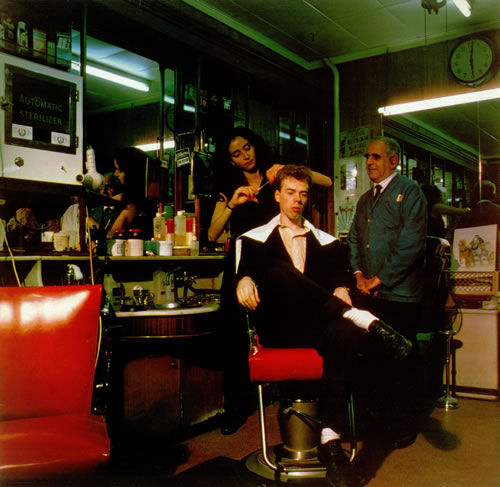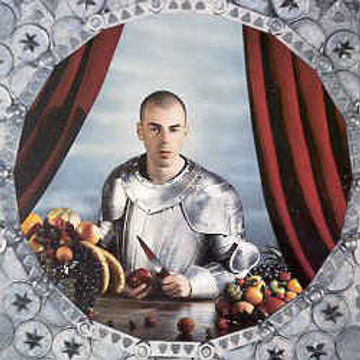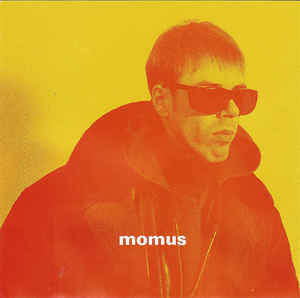Closer to the heart... #7 The Poison Boyfriend
- John Robinson
- Sep 1, 2019
- 9 min read
Updated: Sep 27, 2019
Armed with the finance of Creation Records, the blessing of Alan McGee and a full band, Momus embarked on a second full album. The Poison Boyfriend is the beginning of a full-on assault on stardom of some form. Just look at the cover: look into the eyes, not around the eyes, look into the eyes...
Did this assault succeed? Well, this is the second Momus album I bought, and it was 50p from a discount shop in Canterbury in 1992.

The Gatecrasher: It's immediately evident that the sound has shifted. The track fades in with atmospherics to bring to mind a hazy London night, and a strange teenager crashing a party. The song describes him as struggling to fit in, sporting antique dark glasses and snatching vodka from those who arrive after him. He cannot relate to or connect with the girls at the party, and finds himself daydreaming about a waitress (again with the waitresses!) in Italy.
Is this strange young man Momus? It could be. It could certainly be me, especially this verse:
"He takes in the faces, never quite placing them Squinting his short-sighted eyes And each one reminds him of someone he's known Or someone he faintly dislikes And he can't understand the naive curiosity Forcing two strangers to talk When language is always and everywhere language And people are like cheese and chalk".
These lyrics are perfect, exactly describing the horror of parties where you don't want to socialise, but don't want to be alone, and drink to oblivion.
While the music is still based around an acoustic guitar, the keyboards, bass and backing vocals are clearly sending the song to a different place, more cinematic in sound and approach.
Violets: A Weill-esque cabaret song, but now with improved instrumentation and accordions, this song is an exploration of the Troubles, using military and religious imagery accordingly. The threat of terrorism both in Ireland and across the world is represented by the proliferation of literal worms and snakes which "twist and turn" in the Irish Sea. A "generous American" is satirically included, with the Proustian line "savouring his childhood in an after-dinner mint". Some sections of the song refer to a relationship of some kind, possibly that Momus was in at the time. In the lyrics book "Lusts of a Moron" the initial letters of some lines are emboldened to spell IRA TV, there being a subtext that given a TV show terrorists might calm down a bit. I'm not sure that giving everyone the ability to broadcast on YouTube and Twitter has actually calmed things down at all. It may have made things a tiny bit worse.
Islington John: The story of a trip to Islington, with Momus as the predatory invader of territory, there to steal "your poppy flower". It's set to a reggae beat with a chorus which climbs the scale like a burglar swarming up a ladder. The woman who is being pursued is an actress, not for the last time in a Momus song. She "goes up to the ugly man and they kiss": is this a self-deprecating reference? The trip is nightmarish, with dead dogs, tramps and women drunk on "powdered milk and gas", in other words, it's London.
I have to wonder, would a line like "hey lonely, you with the negro face".. be written now? Brél could get away with it in the 70s, (see the Brél EP "Nicky") but now?
Three Wars: A song which harks back to the acoustic guitar driven sound of the earlier EP on Creation, Murderers the Hope of Women. We have a character's life story in three acts: puberty, middle age and old age, each presented as a war against one or more enemies. Puberty is a battle against the maths teacher who wants to subtract your innocence (divide your legs, add his proclivities and multiply your mental issues), the girl who rejects you, the parents who are now your enemies, and above all your own body. Middle age is a battle against the younger men who want to replace you, the women who rejects you, your own children who rebel against you in their turn, and above all your own body. Importantly the character survives these wars, but not the third war against death. The final verse lifts the song tremendously, the chord shift at 4.33 very effective in representing the escalation in hostilities. The lyric for this verse is very powerful, "the war brings nothing, the unimaginable that the old imagine all the time... imagine imagination dying", and lays the blame for death at all our doors for "refusing the creation of new ways to live". This is one of the last songs which consciously searches for that magic chord, and it's almost successful, but hard to imagine the writer is truly as cynical about life as the character presented. Especially given the optimism of the next song.
Flame into Being: A very literary sounding track.. opens with a self-referential line about crushing his fingers under a pile of books. A song absolutely of its time, to the extent that Martin Amis practically peeps out from under the chorus, and "All I dream about these days is sex with strangers", which with the AIDS crisis of the time would indeed be only a dream. The uplifting chorus is about generating new life and ideas: bringing a flame into being.
The song is a good example of how Momus references and ideas can swoop and plunge from genius to cliché in an instant "You be Judith and I'll be Holofernes" is an appropriately literary reference, and a Bible story to boot (would have worked better than The Rape of Lucretia on the first album), but is immediately followed by "Living with a beautiful woman, I'm jealous all the time", which is just a bloody Dr. Hook lyric basically.
On the other hand:
"Caesar beware the ides of adolescence Here comes some new Brutus in black 501s"
is genuinely witty.
Unfortunately the final verse is just silly, as Momus leaves his wife (!) washing the face of their baby (!!) both of which are extremely unlikely to happen - at this point. I'm almost willing to forgive this however for the line "How whenever I live alone, my hands and eyes work again", which is absolutely true in a way that's very difficult to explain. As I said, swoops and plunges.
Situation Comedy Blues: Momus planned his second album to be a concept album about the BBC, a fact that baffles me whenever I read it, but he has said it several times so it must be true. Several demos were recorded for this and can be found on - hard to believe I'm typing this in 2019 - his LiveJournal account. The album never happened but several of the tracks were released in one form or another over the next few albums. This is one of them.
It is about a comedy writer who has to choose between his career and his woman, and we hear plot details of the sitcom he is writing. The sitcom outlined relies for its laughs on the culture clash between a "Paki and a Queer": given this was written in 1987 it is hard for me to comment on whether this would have been an acceptable premise for a sitcom at the time: it sounds like "Love Thy Neighbour", so I guess it should be called "Love Thy Gay-bour"*. The style is cheesy pop, very cheesy. It's amusing but kind of out of place.
Sex for the Disabled: Up to now, Momus had steered clear of actual politics, but this was a direct and personal attack on Thatcher and Thatcherism. Both "Sex for the Disabled" and "Get fit for life", slogans used in the song, were slogans in the real world used by the left and right wing respectively. This is a narrative song about a man who crashes his motorbike into a gym, crashing into a female bodybuilder. He represents the liberal left, she IS Thatcher. It's not a subtle song:
"As I lay in agony from a thousand savage cuts, you privatised the hospital and you wished me luck". I've put the important words in bold in case you don't get the subtle implications.
The accident and subsequent confinement to a wheelchair also represent the change from hippy ideology to capitalism. The main character is a Hell's Angel, as it was the Hell's Angels causing chaos at Altamont that is often depicted as the death of 60's idealism. This is an idea I fully concur with, you need only look at how the technological hell we currently live in was generated by individuals like Bill Gates and Richard Branson who were originally hippies, and the computer revolution was also a product of the peace movement. This is backed up by the following lyrics:
"Before the accident when you came to power And the poor got on their bikes and we got off ours And the Age of Aquarius changed overnight To an Age of Economists serving the right Yeah, our Triumphs turned to wheelchairs, oh don't times change?"
The song has a powerful progressive structure, adding instrumentation as it builds and using effective backing vocals to stress the actual and genuine anger which you can hear in the delivery.
The venom in the lyrics, the stately pace of the song and the guitars remind me in fact of Carter USM: I can genuinely imagine this being a song on 101 Damnations for instance, or the Love Album. This is not the sort of comparison that will be made very often of Momus' work, so you can understand how unusual this song is in the canon. Also, and it goes without saying, Fuck Thatcher, Thatcherism, Boris Johnson and all the Conservatives, especially Ian Duncan Smith. Sorry, not supposed to bring that up here.
Interestingly, the F word is bleeped out on this album, on the CD version I have and on the streaming version of the Album on Amazon Music. I do not know if this was intentional, or insisted on by Creation, or required for airplay (not that this track would be on Radio much).
Closer to You: An incredibly important track, I don't think even Momus realises how much this track clearly shapes his output over subsequent years. It is a spoken word monologue, with a sung chorus, over a slow, sensual beat.. this track drifts sensually in a way nothing by Momus has achieved up to this point. It's Barry White if Barry White had read a great deal of French Literature and stared at girls on the Tube.
Momus' next several albums would be indebted to the sound created here, and the character he is portraying would pretty much be set as Momus well into the 1990s. The opening line "And maybe you're the circle girl".. is immediately arresting. Rather than the cinematic, widescreen sound of the rest of the album, this is a personal booty call intended to be heard in your headphones. The character (an exaggerated version of Momus) describes several girls he lusts after, speaking directly to them. It's so intimate it's almost uncomfortable, and occasionally falls over the edge of ridiculous:
"I'm looking at the way your toes poke out of your sandals, at funny angles to your feet, and how you know it turns me on".. My friend, I've got gout and blisters, but if you want my feet, stare away.
The verses are erotic, charged with a perverse, stalker-like intensity. There is no doubt at all that Jarvis Cocker heard this song and transferred the style to Pulp's work, just listen to My Legendary Girlfriend, I Spy and even Common People, and you can clearly hear the influence from:
"Or maybe you're the foundation painter at the Central School, looking so fine-boned I could carry you home in your portfolio case".
The song having described the girls goes on to discuss Momus himself and his music. Here he even namechecks actual Momus songs including the execrable "Paper Wraps Rock" and admits:
" some of those are bitter records, records which accuse women, girls like you, of using your attractiveness wantonly and wilfully to trap and to paralyse men who want them and can never have them, men who sometimes feel the perverse urge to trash the women they desire the most, who imagine they despise all those immaculate visions ..... what adolescent crap, what kind of idiot would sing that? Oh, not me ....."
So yeah, it's not just me.
The guitars shimmer and circle more prominently as the song progresses to its (what can only be described as ) climax, as the song discusses creativity and how it is a substitute in men for the real creativity of reproduction, an activity which men are barred from. Finally we get the statement of Paul Klee's epitaph, which provides the title of this blog entry:
"Here lies the painter Paul Klee, somewhat closer to the heart of creation than usual, but far from close enough".
It's erotic. It really is. Of all the tracks on this album which attempt different things, this is an absolute bulls-eye in terms of intent vs. outcome. And clearly he knew it to some extent, as the style and character were transferred to the next album.
And what an album that would be.. with a much more focused sound and considerable advance in lyric writing, the second album for Creation would cement Momus' critical reputation.
*I am so sorry, but what can I do, the pun is mightier than the sword.
It was also around this time that the legendary tour with Primal Scream took place. Alan McGee and Momus have both written about this, with Momus claiming that he enjoyed the experience more than was reported.
In his book Riots, Raves and Running a Label Alan McGee writes about an incident in Berlin, in the No Man's land between East and West. Primal Scream were out looking for vodka whilst Momus was left on the bus. Bobby Gillespie (lead singer of Primal Scream) rang Alan and asked "Alan, can we leave Momus in No Man's land?". Alan says in his book "He'd been driving them nuts on the bus. They couldn't stand him".
Supportive to his new signing, Alan replied "Please don't do that", and despite Bobby's repeated requests, Momus remained on the tour. Alan says he regrets that decision, as if Momus had been found in No Man's land "It could have been amazing, he could have been locked up for a couple of years...".
However accurate all that is, to have been a fly on the wall of that tour bus would have been fascinating, and no doubt literally intoxicating.






Comments